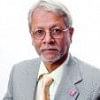
Nizamuddin Ahmed
CHINTITO SINCE 1995
The writer is a practising Architect at BashaBari Ltd., a Commonwealth Scholar and a Fellow, a Baden-Powell Fellow Scout Leader, and a Major Donor Rotarian.
CHINTITO SINCE 1995
The writer is a practising Architect at BashaBari Ltd., a Commonwealth Scholar and a Fellow, a Baden-Powell Fellow Scout Leader, and a Major Donor Rotarian.
And so now the Pope is wrong because he is calling for peace and trying to save lives. He advised Ukraine to show the “white flag”, which other than meaning surrender is also a symbol of peace.
You have all been invited for “daal-bhaat to a gorib’s house” by (surprise, surprise) a well-to-do host. Obviously, he is far from being poor. Or else, he would not have invited you.
The present landlords have been living on their land, happily, merrily, for eons with their elders and children.
There is a reason why you do not see me singing on television.
Relaxing on the deck of his 50-metre yacht, off the Grand Resort Lagonissi in Athens, a quadrillionaire was sipping on his orange juice before a late breakfast. It was spiked with a dash of lemon and fresh mint sprigs.
Grenfel Tower in London was entrapped in the myth that a single staircase under mechanically-induced positive air pressure was safe for a 24-storey block of apartments.
The world is grieving for Pelé, one of its most gifted sons, who won the universe with his football skills.
In the days leading up to the greatest show on earth, miserably apt was the Bangla saying, "Jare dekhte nari, tar cholon banka."
With the third round of Covid surge, educational institutions in Bangladesh are once again subjected to an extended shutdown.
My philosophy, after any tragic fire incident, is to forget it, and rather concentrate on similar conditions that pose threats in the future. Because the fact of the matter is, many potential killing machines are waiting in our waters.
From my flat on the 5th floor, I could hear a beggar beseech anyone who would care to listen for alms.
On the sandy desert of Dubai and in the barren stretches of Abu Dhabi, it is ektur jonno difficult to connect bat with ball, to avoid wides and mokkhom good-length deliveries, and to hold on to a multiple loppa catches with both hands or to stop a boundary with your palm or your booted foot if you happen to speak in Bangla.
In case you have not noticed, climate is not the only manifestation that has changed drastically over the last decade. People have too.
Our wedding feasts are not the usual places to showcase our best behaviour. Reaching out to fetch a bowl of rezala over the next guy, tossing a shami kebab to a needy friend beyond the reach of your spoon, and trying to cover spilt borhani with only one layer of tissue paper are all part of the gaiety.
Unlike the English language, where the hierarchy of age is muddled in the universality of “you,” Bangla distinguishes age, endearment, and insult with the terms “tui,”“tumi,” and “apni”—not in that order—as do several other dialects of the subcontinent.
I have always resented the common belief (due to fabricated propaganda, plus the romanticisation of an emperor who had seven wives) that Samrat Shahjahan “built” the Taj Mahal.
You must have come across people, not necessarily ostentatious, who foretell the future, making a monkey out of the gullible with their forecasts.
Not that we remember her only on August 15th, but she comes alive during events she embraced, at places that hold her memory, on the morning dew shimmering on the green, in the clouds that stand still, dark and heavy.